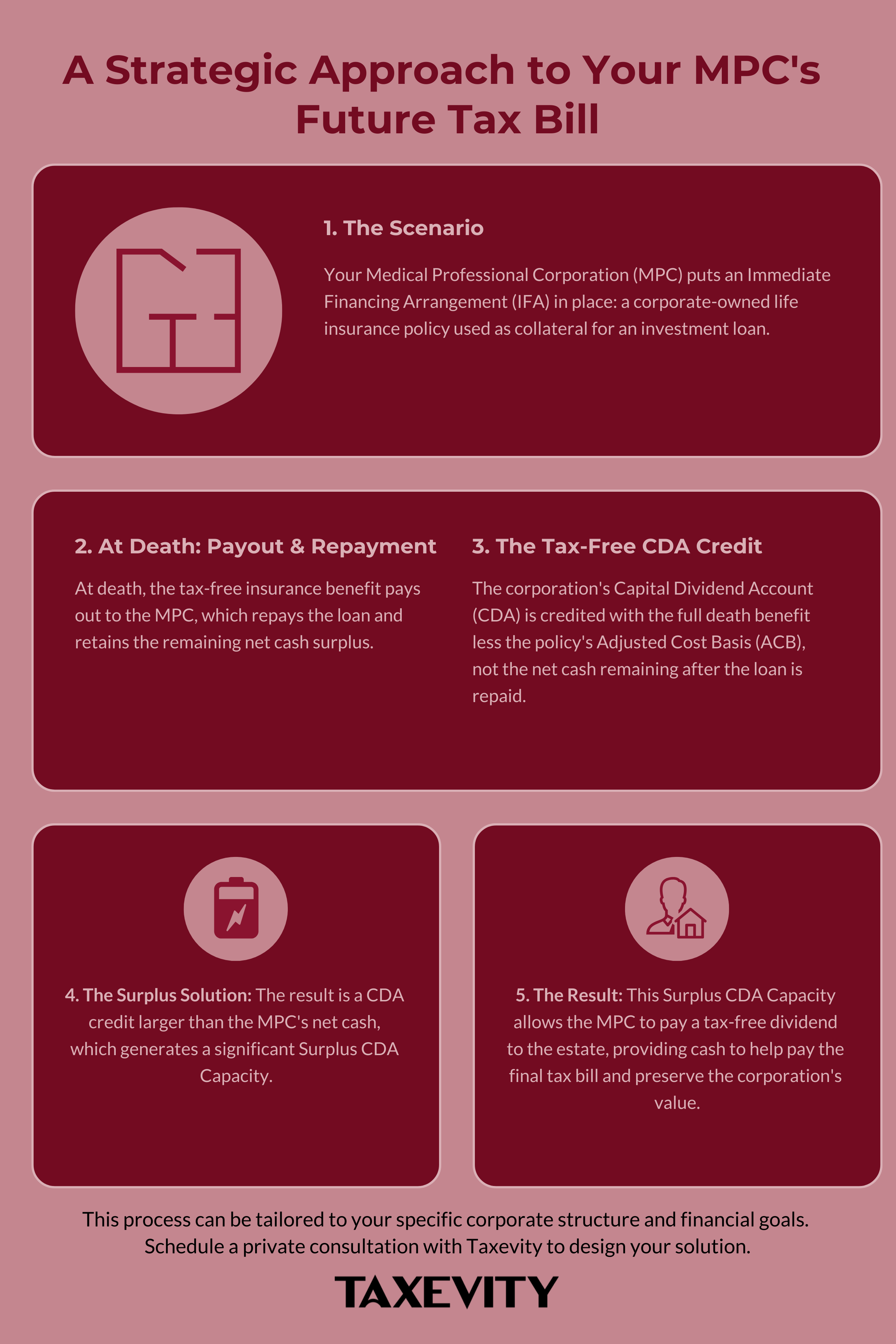(Part of the IFA Master Curriculum)
Key Question for Physician Investors
As a physician focused on long-term growth, have you addressed a common financial blind spot in running your Medical Professional Corporation (MPC): the massive tax liability your estate will face on the deemed disposition of your corporate shares when you pass away?
- A Strategy with a Secondary Benefit: While the foundational purpose of corporate-owned life insurance is for protection, implementing a sophisticated strategy called an Immediate Financing Arrangement (IFA) provides a powerful secondary benefit: a key to unlock the wealth trapped in your company.
- How It Works: This strategy uses the corporately-owned insurance policy as collateral for a loan, which restores the cash flow used to pay the premiums to your business. Upon your passing, this structure creates an IFA-Enhanced Capital Dividend Account (CDA) Credit, providing significant tax-free withdrawal capacity.
- What It Achieves: The surplus of tax-free funds can be paid out of the company to your estate, providing the capital needed to fund your succession plan, secure your family’s future, or ensure your children receive a fair inheritance.
As a physician running a Medical Professional Corporation (MPC) and focused on long-term growth, you are used to managing complex financial decisions. However, there is a common blind spot that can undermine even the most carefully built corporate portfolio: a massive, looming tax liability. Upon your death, the shares of your MPC are subject to a deemed disposition (your estate is taxed as if you had sold your shares the day before you died), which can trigger a significant tax bill for your estate, turning your life’s work into a major tax problem for your family .
The foundation for addressing this liability often begins with corporate-owned life insurance, used to provide essential protection for your estate. Beyond this primary protective role, the policy can be used within a sophisticated corporate finance strategy called an Immediate Financing Arrangement (IFA).
An IFA is an investment loan that uses a life insurance policy as collateral to borrow back part or all of the value of premiums paid. This improves your corporation’s capital efficiency, allowing it to acquire a large insurance asset without permanently draining working capital from your investment portfolio. When structured correctly, this strategy leads to an IFA-enhanced Capital Dividend Account (CDA) Credit — an outcome that generates a surplus tax-free payout to solve your future tax problem and preserve the value of your life’s work for your family
Page Contents
The Problem: Your MPC’s “Trapped” Value and Future Tax Bill
The value in your MPC—your investment portfolio, equipment, and retained earnings—is “trapped”. To access it personally, you must pay yourself a salary or dividend, which is taxed at high rates. At death, this trapped value creates a double-taxation problem: the corporation’s assets are taxed, and your estate is taxed again on the value of your corporate shares.
The result? A huge portion of the wealth you’ve meticulously built is eroded by taxes, leaving less for your family and forcing the potential liquidation of your investment portfolio at an inopportune time.
The Solution: A Corporate Finance Tool for Your Personal Legacy
The IFA-Enhanced CDA strategy uses corporate-owned life insurance as collateral for an investment loan, creating a powerful tax advantage upon death. This is a structural finance solution that lets you secure crucial life insurance protection. The loan proceeds, in turn, are used to invest in income producing vehicles to allow for interest deductibility, which may require adjustments to your existing portfolio (though the terms of the requirement may not be as strict as you think). For more details, see our Physician Companion on optimizing interest deductibility.
To illustrate, consider this example:
- Life Insurance Death Benefit: $4,000,000
- Outstanding IFA Loan Balance: $2,000,000
- Policy’s Adjusted Cost Basis (ACB): $300,000
Financial & Tax Consequences:
- Net Cash Inflow: The MPC receives $4,000,000, repays the $2,000,000 loan, and is left with $2,000,000 in net cash.
- CDA Credit Created: The CDA is credited with $4,000,000 (Death Benefit) minus $300,000 (ACB), for a total credit of $3,700,000.
The MPC now has $2,000,000 in cash and a $3,700,000 tax-free distribution capacity. After distributing the $2,000,000 from the death benefit tax-free, it is left with a Surplus CDA Capacity of $1,700,000. This surplus can now be used for the corporation’s other “trapped” assets, allowing them to be paid out to the estate as completely tax-free capital dividends.

Why an IFA Is More Than Just an Investment
For the data-driven physician, an IFA achieves several key objectives:
- Solves a Known Liability: It directly addresses the future tax bill on your corporate shares, the largest single financial liability most incorporated physicians face.
- Preserves Your Portfolio: It provides your estate with the cash needed to pay taxes without the forced sale of your carefully constructed investment portfolio.
- Improves Capital Efficiency: The loan structure allows your corporation to acquire a large life insurance asset without permanently draining your working capital, letting your investments continue to grow.

Integrating Tax Strategy with Investment Management
Whether you are a hands-on investor or delegate your portfolio management, the IFA-Enhanced CDA is a specialized corporate finance structure, not an investment product. Proper implementation requires a collaborative team of independent niche specialists in insurance (Taxevity), investments, tax law, and accounting. The IFA is a tool for those who recognize that true wealth management involves integrating sophisticated tax and estate strategy with investment management—because after-tax wealth in the shareholder’s hands is what really matters.
If you are an incorporated physician focused on preserving the value of your life’s work for your family, this strategy warrants your attention.
To learn more about how IFAs can be structured for physicians, you can read our overview of IFA Strategies for Medical Professional Corporations. For a detailed technical review by your accountant, you can share our foundational guide on the IFA-enhanced CDA.
When you’re ready to see an IFA customized for you, schedule a private consultation.





